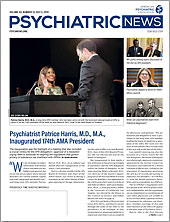This article is part of a regular series on the mental health impact of climate change by members of the Climate Psychiatry Alliance.
Interestingly, my personal narrative involves many harrowing experiences with adverse weather. From 1986 to 1990, I attended medical school in Galveston, Tex. Galveston is a coastal city with an infamous weather-related distinction: In 1900, a hurricane ravaged the city, killing upward of 6,000 individuals. Overall, it was the deadliest natural disaster in U.S. history. Due to this historical catastrophe, the residents in the area tended to be justifiably precautious. When a hurricane was forecast, most inhabitants dutifully reported to the designated hurricane shelter. As luck would have it, the hurricane shelter was the local hospital.
This was the backdrop of my medical school years. Those days gave me hard, firsthand experience dealing with displaced, anxious, and traumatized people. Little did I know that the practical knowledge I gained then would serve me well some years later.
Indeed, there have been quite a few deluges since medical school. During the many severe weather events that I have experienced, I have been both a first responder and an evacuee. During Hurricane Katrina in 2005, I was one of the first individuals to provide medical aid to the many unfortunate individuals who sought refuge in the Houston Astrodome. Because of that work, I was named “Doctor of the Year” by the National Medical Association.
However, I must stress that I also have been helpless during extreme weather events. A few weeks after Hurricane Katrina, I found myself taking to the road. Like many other evacuees, my family and I decided that fleeing to nearby Dallas would be the most prudent way to deal with the imminent arrival of Hurricane Rita. Unfortunately for us, roughly a million motorists joined us in this exodus. The drive from Houston to Dallas, which normally takes under four hours, took us 31 grueling hours.
Professionally, I have seen loss, fear, and exasperation and have helped many cope with the challenges of extreme weather; personally, I have been tested by environmental perils as well. It is my belief that weather conditions are getting more extreme. As unexpected acts of nature unfold, many survivors may endure psychological distress long after the streets are cleared, houses are rebuilt, and utilities are restored.
As the weather becomes more extreme and unpredictable, more people will face abrupt and unexpected loss. Addressing climate change is a progressive and proactive stance that the whole of psychiatry should take. It is hoped that by dampening the extremeness and rapidity of climate change, we can prevent some of the psychological stress that goes along with experiencing natural disasters and weather-related catastrophes. ■

